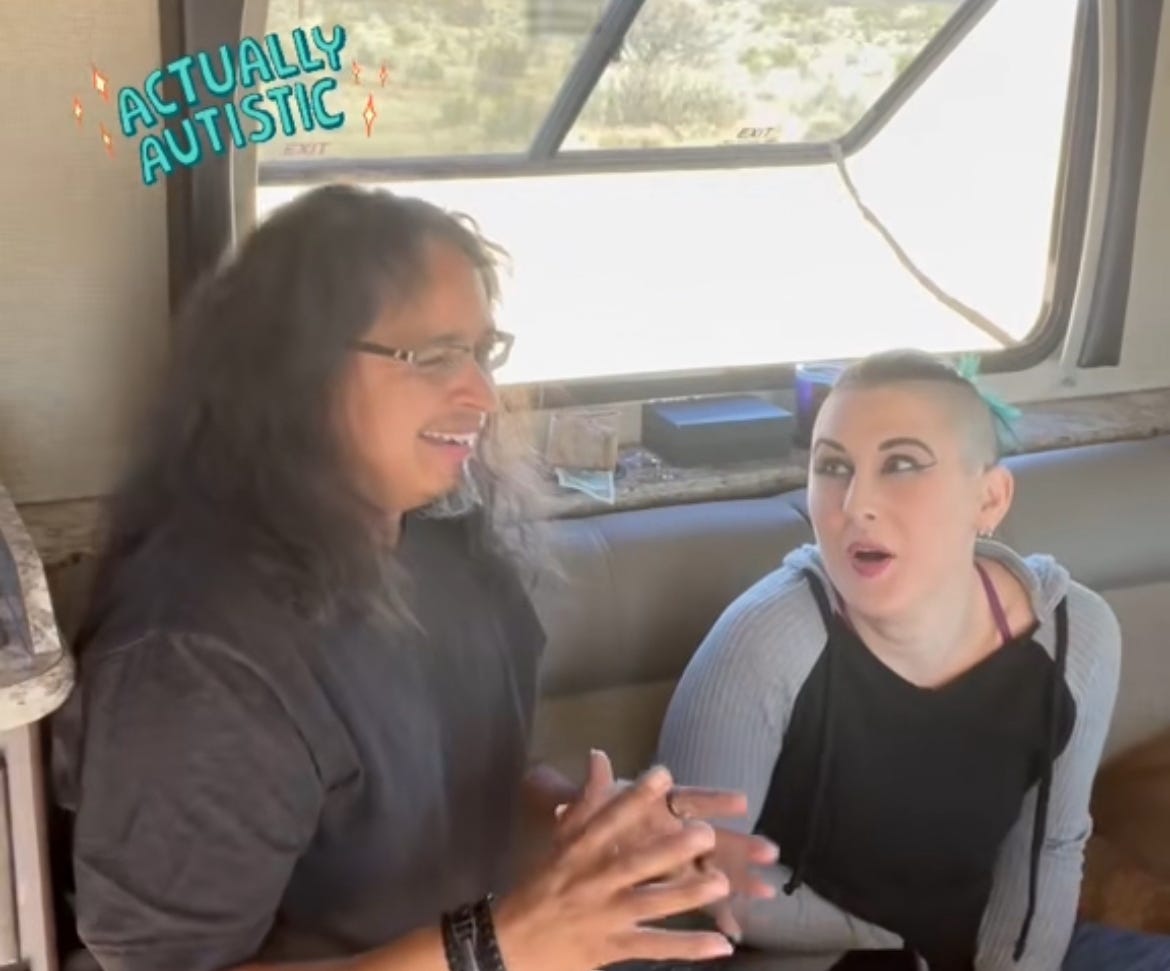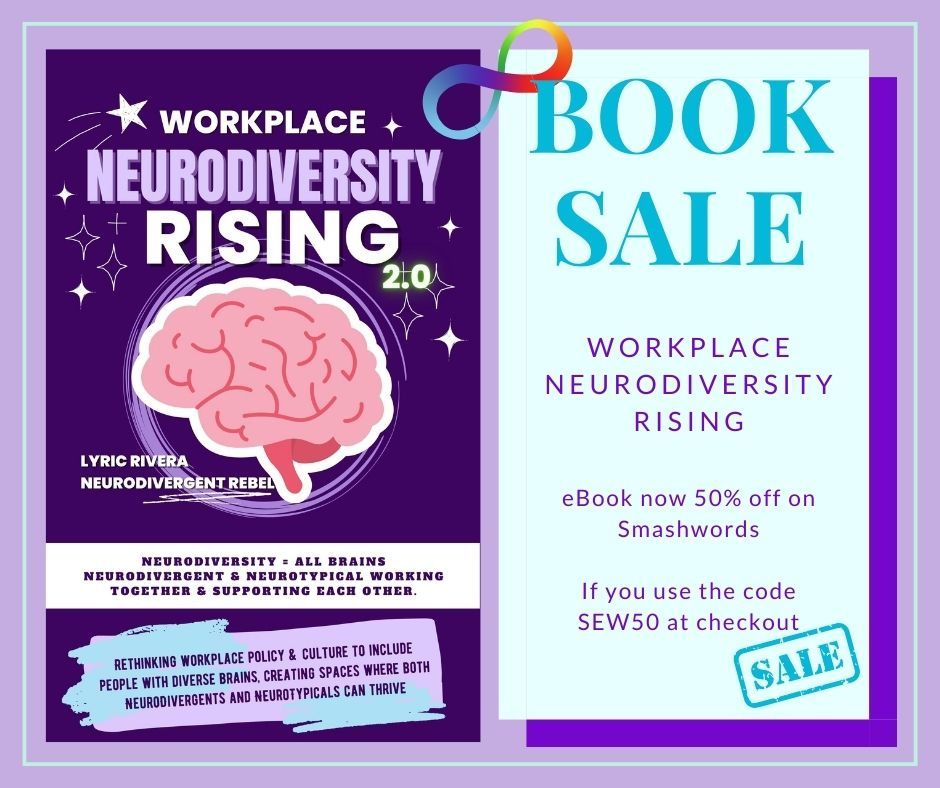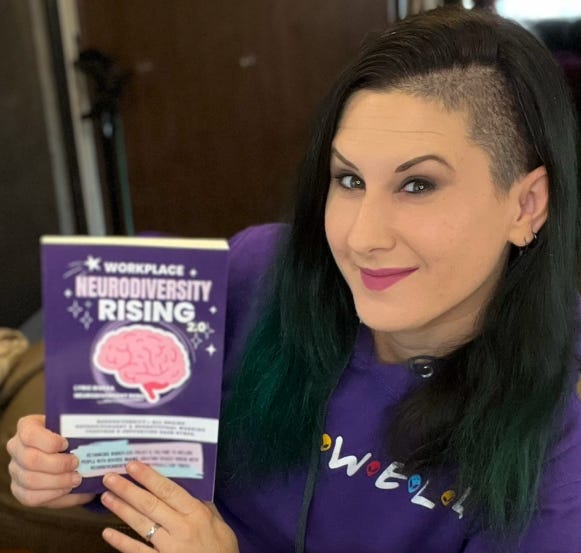What NeuroDivergent People Need to Be Successful in the World
We're asking for our peers (whose needs were considered in society's design) to help us level the field in a world that wasn't built in a way that supports everyone equally
Because there are many ways a person's brain and nervous system can diverge from average, what each NeuroDivergent Person needs to succeed can often vary greatly, depending on the individual you ask.
For example, while some NeuroDivergent People may prefer to receive information and instructions in writing or communicate via email, others may need to listen to information or share it orally instead of reading or writing.
Additionally, it is crucial to recognize that even if multiple NeuroDivergent People share a NeuroType, it doesn't mean they will have the same wants and needs.
My partner and I are both Autistic and ADHD, for example. However, we both have very different sensory profiles from one another (which can cause our sensory needs to clash from time to time).

I'm often cold, and my partner is often hot. My partner LOVES bright lights (and needs them to see sometimes), but this type of lighting can make me physically ill.
Both my partner and I have sensory differences that are due to being Autistic. We both have sensory sensitivities and things we sensory seek due to being Autistic, but our sensory profiles are different. This means, though we're both Autistic, we have different needs as Autistic People.
Multiple NeuroTypes
Another reason two NeuroDivergent People who share a NeuroType may have very different needs from one another is that when we're NeuroDivergent, we often are NeuroDivergent in more than one way. Many of us have multiple NeuroTypes (or brain types), creating layers to our NeuroDivergence.
For example, though my partner and I are both Autistic and ADHD (AuDHD), and we have other NeuroTypes we share, there are also NeuroTypes we don't share.
I am Hyperlexic, which means I communicate best by reading and typing. However, my partner is Dyslexic (and not Hyperlexic) and needs to take in information auditorily (which I sometimes struggle with because of my own Auditory Processing Differences).
While this poses challenges to our relationship (because we both have different communication methods that work well for us despite both being Autistic), our communication similarities (in how we process and understand language) make up for some of the struggles we experience.
Despite our communication differences, another thing that helps our relationship is that we both flex to meet one another where the other is.
Unfortunately, in my experience, it is often the most marginalized, multiply-NeuroDivergent People who are expected to do most of the stretching to be understood in relationships with people who find themselves higher up in our social power structures and hierarchies.
Being closer to the "socially preferred norm" or average brings safety and privilege and (releases pressure for a person to conform). If you are "closer to average," fitting yourself into the average-shaped box is less work, but some of us are too far from the medians to ever fit into the systems as they are.
Because the degrees of variance between NeuroDivergent People can be so vast, there are very few universal solutions for the needs that NeuroDivergent People have. However, because being NeuroDivergent is a form of marginalization in today's world, many of us do not even have our most basic needs (such as food, water, shelter, community, and safety) met because of systemic obstacles preventing us from reaching our goals.
There are things NeuroDivergent People need (that all people need), which we are more frequently denied.
Resource Stability and Physical Safety
Despite the buzz around NeuroDiversity in recent years, many NeuroDivergent People still struggle to find fair and equitable employment. It's crucial that we address this issue and work towards a more inclusive and supportive workplace environment.
Though some NeuroDivergent People cannot work, many NeuroDivergent People want to work. Unfortunately, many employers (even those with NeuroDiversity Initiatives and ERGs or BRGs) still fail to equitably include us (if they're making any efforts), creating obstacles that hinder our workplace inclusion. We are also more frequently underpaid, undervalued, and unemployed (when compared to our Neuro-Average peers).
Without proper support, staying employed (or gaining fair and equitable employment that pays a living wage) can be impossible for many of us, making life more complicated.
Constant worry and hypervigilance are traumatic, leaving many of us with feelings of hopelessness and scarcity-based mindsets. It is hard to be your best Self when you are hungry or worried about whether you will have somewhere safe to sleep at night, and years of worry tend to wear a person down over time.
Many of us live paycheck to paycheck, never knowing when the next "surprise emergency" will wreak havoc on our lives.
We hope we have enough to eat for the month.
We hope we have enough for the light, water, and gas bills and our rent or mortgage payment.
We hope our car won't break down, we won't have any health problems or other unexpected costs pop up (because those can be really expensive).
Despite all our hopes and dreams, many NeuroDivergent People will find themselves in survival mode (as I did eight years ago). I lived paycheck to paycheck, burning myself out for a job where I was not treated well (or paid my true worth).
We need money to have a roof over our heads, for transportation (to and from our jobs), and to buy groceries (which all keep getting more expensive despite pay barely going up).
In many countries today, people depend on jobs to earn enough money to survive, and if we can't work (or do work that is perceived as "valuable" by our peers in society), our survival will be much more challenging.
Because we live in a capitalist society, work and equitable employment are often significant barriers to NeuroDivergent success (because without them, it's nearly impossible to meet our basic needs). This isn't just true for NeuroDivergent People, but for most marginalized peoples (with the effects being multiplied for multiply-NeuroDivergent and multiply-marginalized peoples). We also need to make considerations for NeuroDivergent People who are unable to work in traditional jobs (or at all).
Since NeuroDivergent Employment is such an important and large topic (that it could easily fill several stand-alone books), I wrote my first book, Workplace NeuroDiversity Rising, on that subject. If you'd like to read more on the specifics around NeuroDivergent inclusion in employment, Workplace NeuroDiversity Rising provides a deeper dive into that topic.
If you're curious about some specific workplace modifications that could be implemented (many with little to no cost), check out Workplace NeuroDiversity Rising, named "Trend for 2023" and praised in Forbes as "an excellent 'how to manual' based on lived experience and professional competence," (found online at www.books2read.com/neurodiversity-rising).
The eBook version of Workplace NeuroDiversity Rising is available for half price through January 1, 2025, as part of Smashwords's End of Year Sale (when you use the code SEW50 at checkout).

MORE INFO:
In addition to our basic needs for Resource Stability and Physical Safety (safety from physical harm), there are other needs that many NeuroDivergent People struggle to meet.
The Need for Community Stability and Emotional Safety
All humans need to feel loved, accepted, and appreciated for who we are.
We need to be accepted as the whole, complex, nuanced people that we are and not expected to leave parts of ourselves behind, feeling safe to be our true selves in the various spaces and communities we enter.
Being a member of a community where one can find both physical and emotional safety means having a support system that can help foster and grow in Internal Stability, strengthening a person's sense of self-worth. Unfortunately, many NeuroDivergent People are denied opportunities to experience true psychological and emotional safety in today's society because supportive, neuro-affirming communities and spaces are still hard to find.
Paid subscribers have access to the rest of the story. Thanks to every one of you for supporting my work.
If you are in need of a discount, please use the button or link below to get your subscription at a deep discount (because I don't want money to be an obstacle to people):
https://neurodivergentrebel.substack.com/LowIncomeDiscount
For readers experiencing financial hardship, please note that this offer is exclusively for you. This discount is offered on the “honors system” - I am not going to ask anyone for proof.
Please, kindly refrain from taking this offer if you do not need it.
I hope this helps,
- Lyric
Keep reading with a 7-day free trial
Subscribe to NeuroDivergent Rebel’s Substack to keep reading this post and get 7 days of free access to the full post archives.







